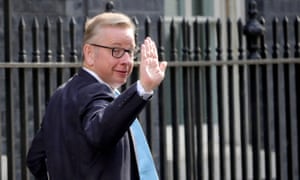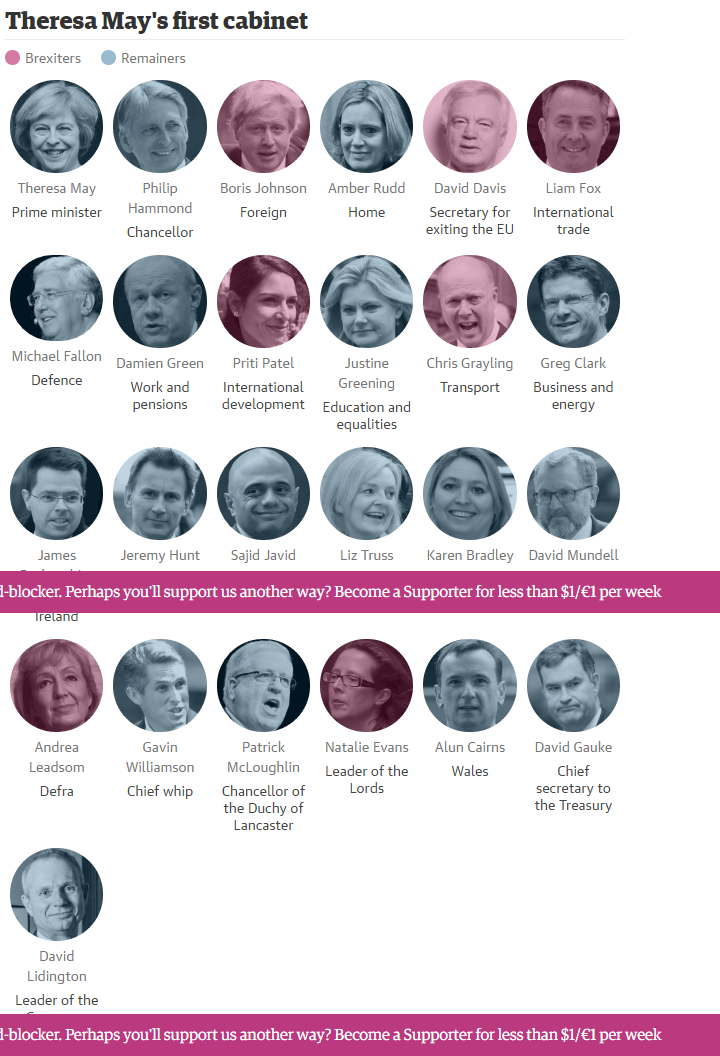 Michael Gove was one of the most prominent Brexit campaigners. Photograph: Christopher Furlong/Getty Images
Michael Gove was one of the most prominent Brexit campaigners. Photograph: Christopher Furlong/Getty Images
Theresa May has unveiled a wholesale reconstruction of the cabinet, with Michael Gove and Nicky Morgan among the big names leaving the government and those promoted including Justine Greening, Liz Truss and the prime minister’s one-time leadership rival Andrea Leadsom.
Almost all the cabinet jobs changed hands, but the few non-movers were the health secretary, Jeremy Hunt, the defence secretary, Michael Fallon, and Alun Cairns at the Wales office. Of the 21 cabinet posts announced, seven went to women, almost exactly the same proportion as under David Cameron.
One of the major changes was structural, with Greg Clark, formerly the communities secretary, to head a newly created Department for Business, Energy and Industrial Strategy. This swallows up what was left of the business department – after large sections were transferred to other ministries – along with energy and climate change, and brought criticism that May was not treating environmental concerns seriously enough.
May made her first major appointments on Wednesday evening, naming Philip Hammond chancellor and Boris Johnson foreign secretary. The first big move of Thursday was the departure of Gove. Among the other casualties were John Whittingdale, the culture secretary, and Oliver Letwin the Cabinet Office minister.
Also gone is Stephen Crabb – the work and pensions secretary and one of the contenders for David Cameron’s job – seemingly voluntarily. Crabb said he had resigned from the government “in the best interests of my family”. This followed a story in the Times at the weekend in which it was alleged that Crabb, who is married, had sent sexually explicit social media messages to a young woman.
There were numerous reports that Hunt was going to lose his job, but Downing Street said he would remain. Hunt tweeted that reports of his demise had been greatly exaggerated:
‘Reports of my death have been greatly exaggerated…’ Thrilled to be back in the best job in Government.
Theresa Villiers, the Northern Ireland secretary, left after refusing a move. She said on her Facebook page: “The new prime minister was kind enough to offer me a role but it was not one which I felt I could take on.” Villiers did not say what role she turned down.
Villiers’ replacement as Northern Ireland secretary is James Brokenshire, whose elevation to the cabinet had been widely expected after five years as a junior minister in May’s Home Office and his early backing for her leadership campaign. The position could grow in importance in the coming years, as Northern Ireland, which voted in favour of remaining in the EU, wrestles with the implications of Brexit.
One of the early appointments on Thursday was Truss, previously environment secretary, who emerged from No 10 to announce she had been appointed justice secretary and lord chancellor. She is the first woman in either role.
Greening was promoted to education secretary and minister for women and equalities, moving from international development. She is the first education secretary to have had a comprehensive school education and will run a beefed-up department, taking in higher and further education from the Department for Business, Innovation and Skills.
Leadsom, the final challenger to May for the leadership, who removed herself from the race on Monday after appearing to argue that being a mother made her the better choice, has seemingly not suffered too much for her actions. She has been promoted from energy minister to a full cabinet post as environment secretary.
After Whittingdale’s exit, the post of culture secretary has gone to Karen Bradley, formerly a junior Home Office minister.
Whittingdale, whose tenure saw a major re-examination of the BBC, announced his departure on Twitter:
Has been a privilege to serve as Culture Secretary. I wish my successor every success & will continue to support creative industries
Chris Grayling, who chaired May’s leadership campaign, was appointed transport secretary. This is arguably a sideways move for a minister who attracted much criticism as justice secretary before moving to leader of the Commons, although his new role will involve some potentially difficult decisions connected to airport expansion and the HS2 rail project.
Patrick McLoughlin, who previously held the transport role, has become chancellor of the Duchy of Lancaster and Conservative party chairman. The former, a non-portfolio job, does not usually come with full cabinet status, though incumbents often attend.
Damian Green, a former immigration minister and police minister who has been out of government for two years, has his first cabinet post as work and pensions secretary, Downing Street announced. Green, 60, is a relatively experienced MP, having represented Ashford in Kent since 1997.
Sajid Javid, formerly the business secretary, has been moved to become the communities and local government secretary, according to another Downing Street statement. The change in role could be interpreted as a sideways move or slight demotion for the former banker.
Gavin Williamson, a Staffordshire MP who spent nearly three years as Cameron’s parliamentary private secretary, was promoted to become chief whip.
One of the final appointments was Priti Patel, the employment minister and a leading voice for Brexit, who was promoted to run international development.
Gove, who fell out badly with May over religious extremism when she was home secretary and he was education secretary, was dismissed on Thursday morning, according to sources. He had stood against May to replace Cameron as Conservative leader but fell in the second round of voting. Shortly after his departure was confirmed, he wished best of luck to the new government:
It’s been an enormous privilege to serve for the last six years. Best of luck to the new government – MG
Morgan, who supported Gove’s leadership bid, was dismissed as education secretary. She tweeted:
Disappointed not to be continuing as Education Secretary & Min for Women & Equalities – two wonderful roles it's been a privilege to hold
— Nicky Morgan (@NickyMorgan01) July 14, 2016
Letwin left the post of chancellor of the Duchy of Lancaster and saw the role Cameron had just given him as head of his Brexit unit rendered defunct.
There was also a new leader of the House of Lords, Lady Evans, ennobled in 2014 after a career in thinktanks and education policy.
News of the awarding of six cabinet posts came hours after May went to Buckingham Palace to formally become prime minister.
As well as Hammond and Johnson, another major appointment announced on Wednesday was Amber Rudd as home secretary. Rudd moves up from her position as energy secretary despite only entering parliament in 2010.
Two other jobs were given to strong Brexit supporters brought back from the cold. David Davis took on the new job of secretary of state for exiting the EU, six years after he resigned as shadow home secretary to refight his parliamentary seat in a protest over detention without trial for terror suspects.
Liam Fox, who quit as defence secretary in 2011 amid revelations his close friend, the lobbyist Adam Werritty, had travelled with him on official business, was made secretary of another new ministry for international trade.
The new chief secretary to the Treasury was announced as David Gauke, who moves up a place in the department’s pecking order, whileDavid Mundell remains as secretary of state for Scotland, little surprise as he is the only Tory MP in the country.
The final appointment was David Lidington as leader of the Commons, a very late debut in cabinet for the former Europe minister, who has been in parliament since 1992.



































